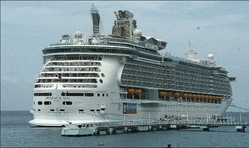
The world's largest cruise ship, Freedom of the Seas, as it docked in Ocho Rios, Jamaica's cruise port capital in August 2007. - File
The National Cruise Council of Jamaica (NCCJ) is urging the country's decision-makers not to execute any hasty measures that might result in changes to the cost structure affecting both hotel and cruise lines at this time.
"In these economic times, where overall world tourism business is decreasing, as a destination we need to do everything within our power to keep the business flowing because that is what our competitors are doing in the extremely competitive world market that we share," NCCJ President John Byles said.
Noting that both land-based and cruise business were critical components to the survival of companies that form the linkages within the tourism industry, Byles said the island's many attractions, ground handlers, craft and inbond merchants were all beneficiaries and this fact should not be discounted.
Unequal contributions
His comments come days after industry partners expressed concern over the inequities between the hotel and cruise sector in relation to contributions to the Tourism Enhancement Fund (TEF).
The NCCJ head is warning that any change in cost to the island's buyers (tour operators/ cruise lines) is being closely analysed and monitored and will, at some point, trigger action which could mean loss of business from these partners.
Highlighting some points that decision-makers should take into account before taking any actions, he said a number of issues must be considered.
Competitive cost
"Tourism generally is undergoing severe challenges though Jamaica has been bucking the trend in its stay-over business," Byles said.
"Increasing cost of Jamaica as a destination to any part of its supply chain in a competitive marketplace where every destination is fighting for market share will most likely have negative implications on future business."
He added: "The cruise ships are calling on the island's ports at full capacity with passengers who are still spending in the destination. It is not the time to be taking a hard line position if we want to encourage them to increase their calls to our ports."
Byles said operators run about 80-100 per cent of capacity on cruise days and 20-30 per cent hotel-only days.
"Moreover, the cruise lines operate within the scope of contracts which have been agreed upon with the Government of Jamaica and are paying those fees accordingly," he noted. "The potential for additional investment by the two major cruise lines in Jamaica, Royal Caribbean and Carnival in 'experience-based' investments could far outweigh this additional US$2 tax that is at the heart of the contention."
He said the cruise lines have demonstrated the willingness to invest in Jamaica as they did with projects such as Chukka Zipline Canopy, Mystic Mountain and preliminary work in Falmouth.
"The fact is that attractions, transport and craft have an immediate and valuable gain by each call on our ports," Byles argued. "Cruise monies are a shot in the arm estimated at about US$200,000 per call that goes directly into the tourism sector as direct cash flow and maintaining jobs and feeding families, which is so critical in these times."